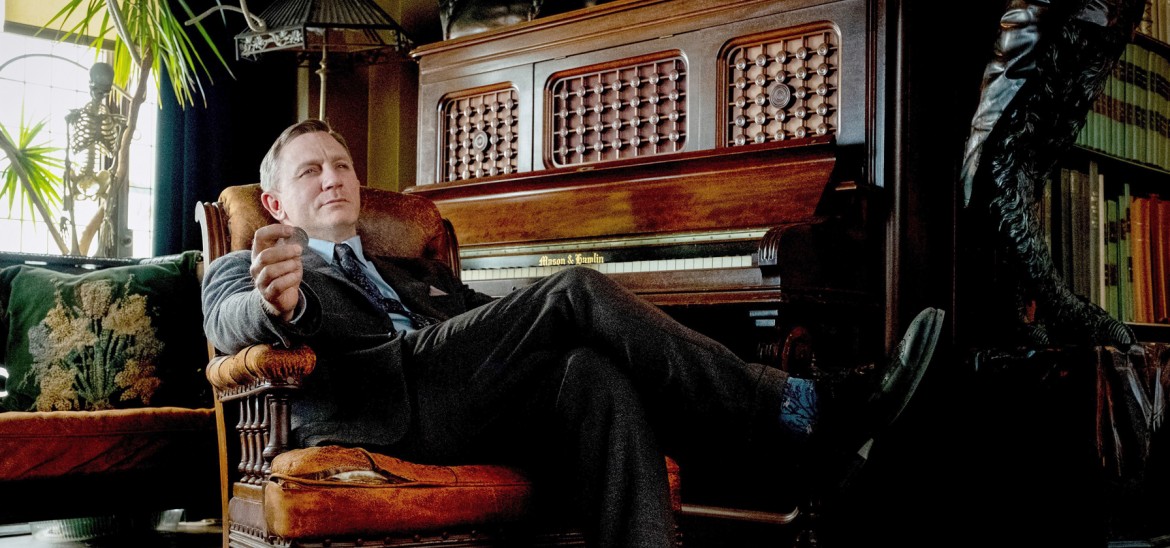Into Film Clubs
Find out everything you need to know about starting an Into Film Club.



When acclaimed crime novelist and patriarch Harlan Thrombey is found dead at his estate after celebrating his 85th birthday, the cause of death is thought to be suicide. But when an eccentric detective digs a little deeper, foul play is suspected, with Harlan's entire extended family coming under suspicion in this modern twist on the murder-mystery from Rian Johnson.
The murder-mystery genre, also affectionately termed the 'whodunit' (since the audience revel in trying to work out which of the many suspects is guilty), has long been a staple of literature, stage and screen. It was popularised by Agatha Christie in her fiction writing throughout the 1920s and 30s through titles such as Murder on the Orient Express (1934) and Death on the Nile (1937), both led by famed mustachioed detective Hercule Poirot. Christie was also known for her theatre plays throughout the 1950s, including The Mousetrap, which opened in 1952 - the longest-running West End show in London that continues to entertain to this day - and Witness for the Prosecution which followed a year later.
Christie's influence has endured over time, with BBC mini-series of some of her more well-known works being broadcast over Christmas in recent years, as well as Sir Kenneth Branagh's film versions of both Murder on the Orient Express in 2017 and Death on the Nile set to follow in October 2020. The genre as a whole has continued to flourish in the decades since with continued appetite from audiences, whether it's through playful homage like Clue, contemporary additions to the canon such as Gosford Park, or horror slasher films like the Scream franchise. Whodunits continue to pervade popular culture, as some of the most iconic plots in soaps and sitcoms have also been whodunits, with Dallas, The Simpsons and EastEnders asking audiences who shot J.R, Mr. Burns and Phil Mitchell, respectively.
In the case of Knives Out, Johnson's film presents many of the familiar tropes and characteristics of the genre while subverting and modernising others. Some of the age-old conventions which are present include an ensemble ball-star cast full of archetypal characters in which everyone's a suspect, an eccentric detective who appears to be one step ahead of both the audience and the accused, and a grand location for it all to take place in. As you would expect, there are exciting revelations, twists and reveals as the story progresses.
Please note: the following clip contains one use of strong language.
As far as the characters are concerned, everyone's a suspect as they each have a motive: they all expect to inherit a share of Harlan's luxury estate via his will, only to find themselves snubbed when Harlan dies. But as the detectives interview the suspects, each come under the microscope in turn and reveal further insights into themselves as they describe the events of the previous night. Revelations from the party are uncovered: Harlan threatening to disclose his son-in-law's extra-marital affair; the loud confrontation he had with his grandson over his will; his youngest son being informed that he's no longer part of the family business; and the financial difficulties of Harlan's daughter-in-law. But the character at the centre of it all is detective Benoit Blanc, mysteriously hired by an unknown individual to take on the case and get to the bottom of it.
The unconventional detective is another staple of the genre. From the aforementioned, instantly recognisable Poirot to 221B Baker Street's very own master of deduction, Sherlock Holmes, oddball investigators have populated cinema from its earliest days, each with their unique trademarks, be it large moustaches or deerstalker caps. Benoit Blanc, a world famous detective played by Daniel Craig, continues this tradition with a comically exaggerated southern accent which lulls the members of the Harlan family into a false sense of security while he slowly puts the pieces of the puzzle together in his head. As director Johnson explains: "Whether it's Poirot, Columbo, Mrs. Marple or whoever, one of the big unifying elements among movie detectives is that there's always something about them that makes you not quite take them seriously."
Another key feature of the murder-mystery is a lavish setting, usually a confined space for the drama to play out, such as the train in Murder on the Orient Express or the isolated island for And Then There Were None. More typically, though, it is a grand house or estate as found in Clue, Gosford Park and others, including Knives Out. According to production designer David Crank, "the first thing that Rian and I talked about is that the house should be an outward mirror of the kind of world Harlan liked to create in his books... so it's all a little bit twisted."
Houses like these have played a key part throughout cinema history and iconic residences are most often found in the horror genre - from The Addams Family to Psycho - or in dramas about wealth inequality, such as Downton Abbey. Whodunits often have elements of both horror (murder) and social/economic themes, and Knives Out, like Gosford Park before it, combines the two to delightful effect.
Not content with simply paying homage to the murder-mystery, filmmaker Rian Johnson has the ambition to put a fresh, modern spin on the genre. Johnson is not afraid of putting his own stamp on things - as shown by the decisions taken in Star Wars: The Last Jedi and its surrounding fan reactions - nor is he new to the mystery genre, having kicked off his directorial career with high-school noir Brick.
Without saying too much - lots of the film's fun is found in the surprises it serves up. Knives Out stays faithful to the big reveal but manages to do it in a way which feels different to those that came before it, revising the structure in a significant way. Furthermore, it's also a film with a social conscience, reflecting modern society in its timely examination of themes such as race, immigration and privilege, as well as the political situation around the world, giving the film a deeper resonance beyond its surface appeal. But to say more would be to give too much away - the best way to experience Knives Out is to enjoy the thrills for yourself in a cinema near you.
Knives Out opens in UK cinemas on 27 November 2019. Visit FindAnyFilm to locate screenings near you.
Viewing 4 of 4 related items.

Get in touch with your article ideas for the News and Views section.